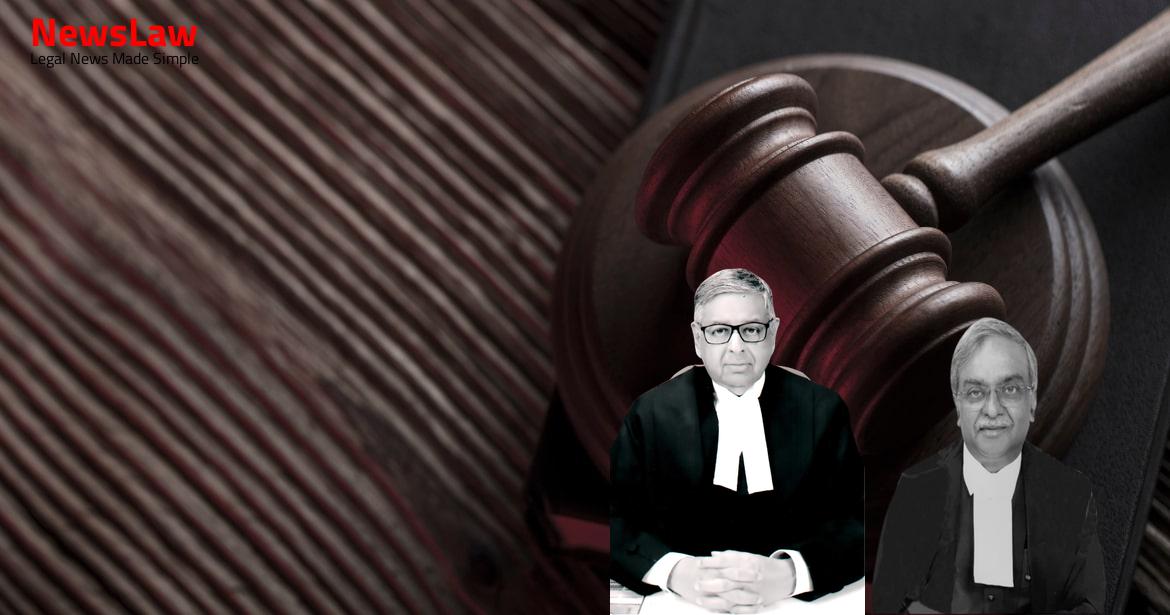Explore the in-depth legal analysis conducted by the court in a recent case concerning a dispute over land allotment. The court’s examination of relevant resolutions and statutes provides valuable insights into the complexities of property rights and government regulations. Stay tuned for a closer look at the nuances of this intriguing legal battle.
Facts
- Respondent No.1 entered into an agreement to purchase rights to occupy Flat No. 211 and five shares in the Society.
- The High Court allowed the writ petition filed by the State.
- M/s. Aesthetic Builders Pvt. Ltd. made a bid for Plot No. 121 based on a notice.
- Mr. A. Madhavan sold his rights in the flat to Mrs. Reshmidevi Agarwal in an agreement.
- The State invited offers for the lease of various plots in 1971.
- The purchasers of the flats formed Varuna Premises Co-operative Society Ltd. after the building was completed and registered it under the Maharashtra Co-operative Societies Act, 1960.
- The subject of the dispute is Plot No. 211, initially sold to Mr. A. Madhavan in 1972.
- The State contended that premium could be claimed for permission to transfer flats based on Government Resolutions.
- The Collector directed the Sub-Registrar not to register any transactions in certain buildings without a No Objection Certificate.
- The respondents challenged the Collector’s letter through a writ petition.
- A twenty-two storey building named Jolly Maker Apartments No.3 was constructed on the plot by the Company and sold on ownership basis.
- Respondent No.1 was declined registration and directed to obtain a No Objection Certificate from the Collector.
- The State has appealed the judgment and order dated 29 September 2009 passed by the Division Bench of the High Court of Judicature at Bombay in Writ Petition No 713 of 2001.
- The Division Bench of the High Court allowed the writ petition filed by the respondents.
Also Read: Presumption of Genuine Endorsements in Cheque Case
Issue
- The issue in the present case pertains to the allotment of a plot to a builder in the year 1972.
- The facts related to the allotment are undisputed.
- The key aspect under consideration is the legality and implications of the allotment made in 1972.
Also Read: Medical Negligence and Compensation: A Landmark Decision
Arguments
- Shri Naphade argued that the High Court’s judgment is not valid due to various reasons.
- He pointed out that the builder agreed to abide by all lease terms in a communication dated July 5, 1972.
- Section 40 of the Maharashtra Land Revenue Code allows the State Government to dispose of land as it sees fit.
- He disagreed with the High Court’s classification of the Society under Class 5 and argued it should be under Class 9.
- The issue of concessional rates for land allotment was deemed irrelevant by Shri Naphade.
- He criticized the High Court for relying on the outdated 1983 Resolution instead of the 1999 Resolution.
- The 1999 Resolution specifies the terms for land disposal and should have been considered by the High Court.
- Shri Naphade represented the State’s perspective, emphasizing that the land allotment in 1972 was conditional upon executing an Agreement to Lease.
- The respondent contended that the High Court erred in relying on the judgment in Anita Enterprises v. Belfer Cooperative Housing Society, stating it is not applicable to the current case.
- The respondent argued that the High Court also erred in relying on the Bye-laws of the Society.
- In cases of conflict between the Bye-laws of the Society and the Rules, the respondent asserted that the Rules should prevail.
- It was submitted that the High Court carefully considered all relevant aspects and therefore, no interference is necessary with the judgment and order of the High Court.
Also Read: Remand of Writ Petition for Restoration and Decision on Merits
Analysis
- The land in question was allotted to a builder through a bidding process in 1972, and he constructed a building on the plot.
- An occupation certificate for the building was issued in December 1975.
- The land is reclaimed and covered under Section 295 of the Code.
- The 1999 Resolution modified policies related to allotting government lands to Co-operatives Housing Societies.
- The builder was required to sell the constructed flats for private residence purposes and formed a Co-operative Society in 1977 for ownership transfer.
- The 1983 Resolution aimed at modifying policies due to their age and offered concessional rates for land grants to co-operative societies.
- Although the government had the power to allot lands to co-operative societies, the land in question was leased to the builder who participated in a public bid.
- The builder was required to construct a building worth Rs.10 lakhs for private residences on the land.
- After the flats were sold, a Co-operative Society of flat owners was formed, and the 1999 Resolution continued the policies set in the 1983 Resolution for co-operative societies.
- In 1977, the flat purchasers formed Varuna Premises Co-operative Society Ltd.
- The land was not allotted to a society but to a builder on lease who constructed flats for private individuals
- The occupants subsequently formed a Cooperative Society
- The 1983 Resolution and 1999 Resolution would not be applicable to the members of such a society
Decision
- The pending application(s) will be disposed of in the mentioned terms.
- No costs are awarded in this case.
- The court will not interfere with the present appeals.
- All appeals are dismissed.
- The interim stay on the refund direction is vacated.
Case Title: THE STATE OF MAHARASHTRA AND ORS. Vs. MR. ASPI CHINOY (2022 INSC 1042)
Case Number: C.A. No.-005809-005809 / 2011



